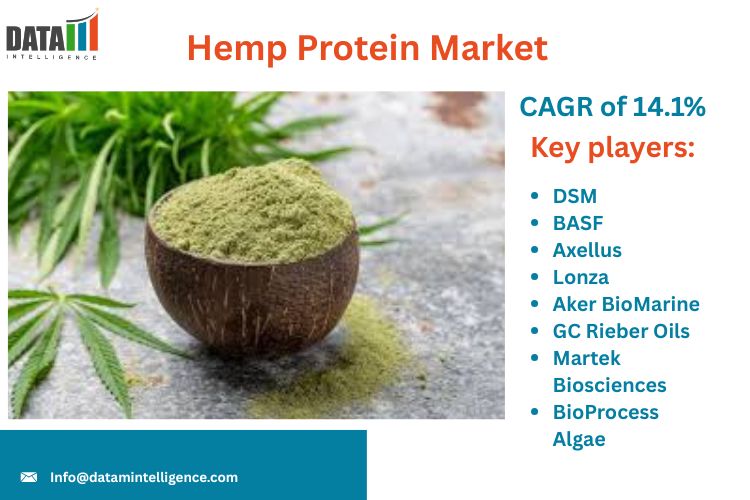
Hemp Protein Market Growth, Trends & Opportunities | Plant-Based Protein Powder Demand 2025

Hemp Protein Market
The Hemp Protein Market is projected to grow at a CAGR of 14.1% during the forecast period 2024 to 2031.
AUSTIN, TX, UNITED STATES, May 21, 2025 /EINPresswire.com/ -- Market Overview:
The Hemp Protein Market is growing rapidly as more people seek plant-based, nutritious alternatives for a healthy lifestyle. Known for its rich amino acids, fiber, and essential nutrients, hemp protein appeals to fitness enthusiasts and clean-eating advocates alike. Its natural, sustainable sourcing adds to its popularity. With rising awareness about wellness and environmental impact, hemp protein is becoming a favored choice in supplements, snacks, and food products worldwide.
To Download Sample Report: https://www.datamintelligence.com/download-sample/hemp-protein-market
Market Drivers and Opportunities:
Key Drivers Boosting the Growth of the Hemp Protein Market
Increasing Popularity of Plant-Based Diets: The global rise in vegan and vegetarian lifestyles is significantly driving the demand for sustainable and plant-based protein alternatives, with hemp protein powder emerging as a favored option.
Growth of the Health and Wellness Sector: As consumers focus more on protein-rich, organic, and non-GMO foods, the market for hemp protein is expanding rapidly, supported by the broader health-conscious trend.
Innovations in Product Development: Continuous advancements in hemp protein formulations, including improvements in taste and solubility, are enhancing consumer acceptance and widening the product’s market reach.
Commitment to Environmental Sustainability: Hemp’s low water usage and minimal need for pesticides make it an environmentally friendly crop, attracting eco-conscious consumers and companies seeking sustainable ingredients.
Market Segmentation:
By Nature:
Organic
Conventional
By Application:
Food and Beverages
Pharmaceuticals
Dietary Supplements
Personal Care
Others
By Region:
North America
Latin America
Europe
Asia Pacific
Middle East
Africa
Geographical Market Share:
North America is presently at the forefront of the global hemp protein market, propelled by a growing consumer preference for plant-based nutrition and rising demand for organic, non-GMO, and clean-label products. The United States and Canada stand out as major markets, supported by established hemp cultivation regulations and cutting-edge food processing technologies.
Europe follows closely, with countries like Germany, the UK, and France experiencing a sharp rise in vegan and flexitarian lifestyles, boosting the demand for plant-based proteins.
The Asia-Pacific region is witnessing accelerated growth, particularly in China, India, and Japan, where an increasing health-conscious population is turning toward plant-based dietary supplements.
Key Market Players:
Prominent companies operating in the hemp protein market include:
DSM
BASF
Axellus
Lonza
Aker BioMarine
GC Rieber Oils
Martek Biosciences
BioProcess Algae
Omega Protein
EPAX
Recent Developments in the USA and Japan:
United States:
In February 2025, Tilray Brands introduced a new line of hemp-derived beverages in the U.S., including products like 420 Fizz, Herb & Bloom, Fizzy Jane's, and Happy Flower. This expansion leverages Tilray's existing beverage distribution network, aiming to tap into the growing demand for hemp-infused products. The company's facilities in Texas and Colorado are poised to support this new product line, reflecting a strategic move to diversify offerings in the hemp-based beverage sector.
In 2024, U.S.-based nutrition and supplement companies significantly expanded their hemp protein product lines to meet rising consumer demand for plant-based, allergen-free proteins. Major players integrated hemp protein into clean-label energy bars, smoothies, and sports nutrition blends. The push for transparency in sourcing and sustainable farming practices further fueled market momentum.
Japan:
By 2025, collaborations between Japanese universities and food tech startups led to advanced research on optimizing the flavor and bioavailability of hemp protein. These efforts helped create more palatable formulations tailored for the Japanese palate, paving the way for wider market acceptance and consumer adoption.
In 2024, Japanese food manufacturers began incorporating hemp protein into functional foods targeted at health-conscious consumers. With a focus on muscle maintenance, digestive health, and plant-based diets, hemp-based snacks and nutritional supplements gained popularity, particularly among the aging population and fitness community.
Related Reports:
Soy Protein Ingredients Market
Sai Kiran
DataM Intelligence 4Market Research
+1 877-441-4866
email us here
Visit us on social media:
LinkedIn
X
Distribution channels: Food & Beverage Industry
Legal Disclaimer:
EIN Presswire provides this news content "as is" without warranty of any kind. We do not accept any responsibility or liability for the accuracy, content, images, videos, licenses, completeness, legality, or reliability of the information contained in this article. If you have any complaints or copyright issues related to this article, kindly contact the author above.
Submit your press release